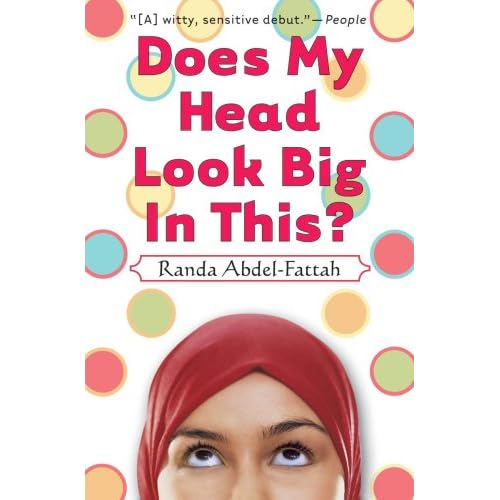Tzniut, or modesty, is an important topic for those who adopt a Torah-true lifestyle. I was attracted to Randa Abdel-Fattah's book, Does My Head Look Big In This?, because it addresses this very issue from the Muslim perspective. I thought it would be interesting to see how a Muslim writer handled it as opposed to the Jewish writers I'm already familiar with.
Amal, a teenager in Australia, decides to begin to wear the hijab (traditional Muslim headcovering) full-time even though she attends a very White prep school. The saga of how her choice impacts more and more of her life flows logically. Amal is a very likable narrator and explains the ideology behind the hijab and other Muslim practices beautifully, and they are very much in harmony with the views of traditional Judaism. I appreciated that we see both the ups and downs along Amal's journey, and that she stays firm on her decision at the conclusion of the book.
Amal, like most teenagers, is OBSESSED with movies, television, Cosmo, celebrity gossip, etc. We see Amal's parents telling her that these pop-culture icons are nonsense, but we don't see her very moved by this. Amal never seems to really get that celebrity culture and fashion magazines are completely the opposite of what the hajib stands for. Some of the trouble she must deal with is actually created by her involvement in mainstream culture. She keeps watching "Friends" even though the characters make life decisions incompatible with Islam, and she compulsively does Cosmo quizzes and uses the magazine's advice to flirt with boys even though she will not date them. I wish the book would have been more insightful about how our society feeds into immodesty, and how it's healthy to step out of that largely-immoral media mix.
Most Orthodox Jews would tell you that the solution is to retreat from secular media, to varying degrees. It's common to monitor our children's television viewing (or ban it from the house altogether), restrict what movies they see, limit internet access, and the like. Many frum children aren't permitted to use cell phones, or the phones do not have text access. And many Orthodox Jews send their children to schools with separate girls' and boys' departments, if not entirely separate schools. I know that many Muslims adopt such strategies (none of which is perfect, but which help)...what puzzles me is that Ms. Abdel-Fattah doesn't bring them up (except that Amal's parents disapprove of Cosmo, so she has to sneak it into the house).
There are fleeting mentions of political beliefs that most Jewish readers will disagree with (there are a couple references to the Palestinian-Israeli dilemma); however, none of these are obnoxious, argumentative, or deeply offensive. There is mutual respect between all sorts of characters (it's very nice that Jewish characters are portrayed favorably, with a marked distinction between politics and religion, although as an Orthodox Jew, I flinched when the Jewish kid falls for a non-Jew).
Two things cause me to hesitate from recommending Does This Make My Head Look Big? to every Bais Yaakov girl, though:
I was surprised that there is some swearing in the book (no F-bombs, though, I think), and there is some frank talk about how Amal's beliefs address sexuality and women's body image, although nothing graphic. However, I think that this book would be a very good read for many young women or even teachers/parents of young women. I think that the book has a lot of insights that are unlikely to be found in a YA novel published by a frum publishing house, and I think the fictional format is particularly useful in approaching this audience. I hope this book's pro-modesty message will reach teens that wouldn't normally pick up an Orthodox Jewish book.



